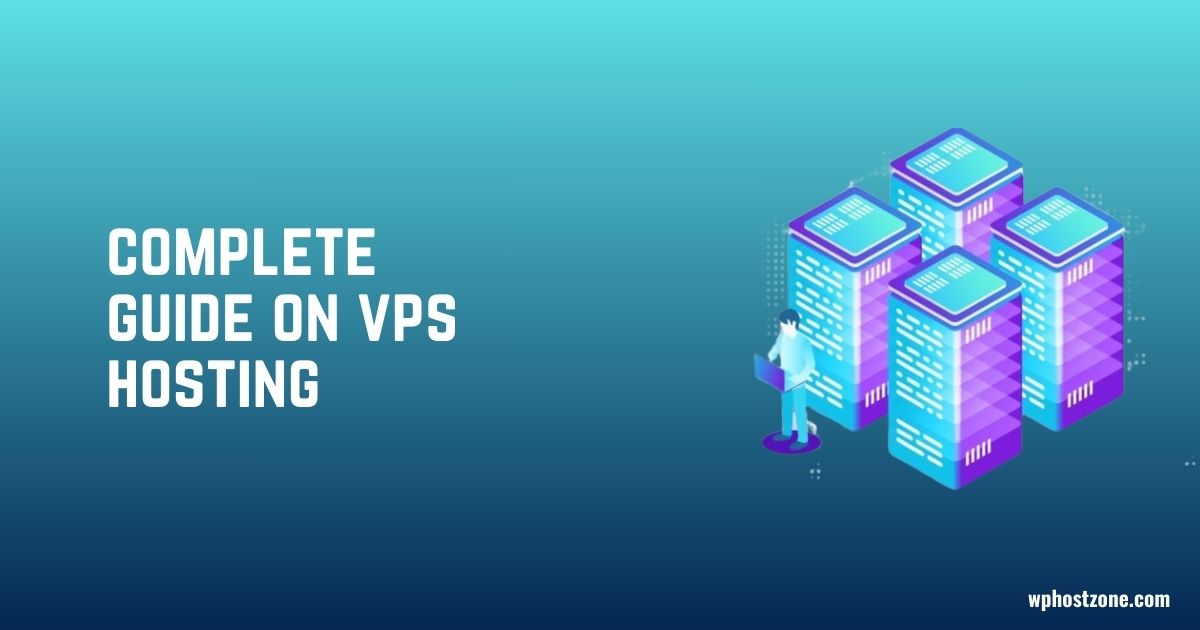When comparing VPS & shared hosting, VPS is more safe and stable than shared hosting, which does not provide a dedicated server space. However, it is smaller in scale and less expensive than renting a whole server.
VPS hosting is typically used by website owners who have medium-level traffic that surpasses the limitations of shared hosting plans but does not require the capabilities of a dedicated server.
Virtual private server solutions typically include more than one hosting plan. For example, at Hostinger, we provide VPS plans to meet various business demands and allow you to smoothly scale your site when you require more resources.
What is a VPS?
VPS (Virtual Private Server) is a service for hosting that employs virtualization technology to give you dedicated (private) resources on a server with multiple customers.
What is VPS? – Video Tutorial
What is a VPS? Learn more with this tutorial and launch your WordPress website with Hostinger web hosting.
How Does VPS Hosting Work?

A server is a computer that your web host uses to store your website’s files and databases. When an online visitor wants to view your website, their browser sends a request to your server, which transfers the appropriate files over the internet.
VPS hosting offers you a virtual server that simulates a physical server, but the computer is shared by multiple customers.
Your hosting provider uses virtualization technologies, such as a hypervisor, to create a virtual layer on top of the server’s operating system (OS). This layer partitions the server, allowing each user to install their operating system and apps.
As a result, a virtual private server (VPS) is both virtual and private, as you have complete control. It is separated from other server users at the OS level. In truth, VPS technology is akin to partitioning your computer so that you can run multiple operating systems (e.g., Windows and Linux) without rebooting.
A VPS allows you to host your website in a secure container with assured resources (memory, storage space, CPU cores, etc.) that you do not have to share with other users. VPS hosting provides the same root-level access as a dedicated server but at a far cheaper cost.
Comparing VPS to Other Web Hosting Types

Different web hosting plans allow you to customize your server to various degrees. They differ in terms of pricing, performance (for example, page load time), and service availability. Read on to see how VPS hosting compares to other hosting solutions.
Shared Hosting
Shared hosting is ideal for website owners with low-traffic sites. It is the beginning point for most small enterprises and blogs. Even with the greatest shared web hosting package, you share the same physical server with the hosting company’s other clients. You do not receive dedicated resources because your site uses the same operating system as everyone else’s.
As a result, the amount of memory and computing power available to your site is affected by the needs of other service users.
For example, if a website hosted on the same server experiences a sudden traffic spike, the page load time may increase. You cannot choose your operating system or other server software because all users share the same configuration. Overall, your hosting provider manages all aspects of your shared hosting environment.
You can think of shared hosting as a rental in which you share an apartment with several roommates. VPS hosting is still a type of flatshare, but each person has a room that they may personalize to meet their specific needs. For example, they can choose the painting, furniture, and decorations.
If you want to convert your website from shared hosting to VPS, read our post.
Cloud Hosting
Cloud hosting services use a cloud-based network rather than a single server. Every server in the cluster keeps an up-to-date copy of your website. When one of the servers becomes overloaded, the cluster instantly sends traffic to another less busy server. As a result, cloud hosting has no downtime because a server in the cluster is always available to serve your website visitors’ requests.
Explore an in-depth guide to learn more about cloud hosting and how it may improve website performance and scalability.
WordPress Hosting
WordPress hosting is a service specifically designed for WordPress website owners. It includes various WordPress-specific features that are only available if you have a WordPress site, such as one-click installation, pre-installed plugins, and a WP command-line interface.
WordPress-specific servers have been established. As a result, hosting providers offer WordPress hosting as part of their shared hosting plans.
Although it is possible to set up a WordPress site on a virtual private server, you cannot access custom-built servers configured specifically for WordPress.
However, if you still choose a VPS for your WordPress site, you may build up and configure your hosting environment to meet your specific business requirements.
Dedicated Hosting
Dedicated hosting involves renting a whole physical server for your organization. If you have a high-traffic website, dedicated hosting may be the ideal option for you because dedicated servers are fast, flexible, and completely customizable. However, the service does come with a cost, so it is not suitable for everyone, particularly if you run a small or medium-sized website.
VPS hosting allows you to select and configure your operating system and server software, whereas dedicated hosting goes a step beyond. It allows you to configure both the software and the hardware because the entire server is yours and no one else has any say in the setup.
You can also run a dedicated server on-site, (such as in your office), however, you lose the support of a professional hosting team in that case.
Pros and Cons of Virtual Private Servers
If you require a specific service, VPS hosting may be the best option for you. Read on to learn about the pros and cons of running a virtual private server.
Pros
- It’s faster & more shared hosting servers in terms of speed and reliability.
- Because server resources like memory and processing power are assured, there is little to no fluctuation in available resources.
- Issues and traffic surges caused by other server users do not affect your site.
- You are granted superuser (root) access to your server.
- You have greater privacy because your files and databases are protected from other server users.
- It’s an easy-to-scale service. As your website expands, you may quickly increase your server resources (RAM, CPU, disk space, bandwidth, and so on).
Cons
- It costs more than shared hosting.
- Setting up a VPS involves more technical knowledge, but there are plenty of tutorials available online.
- Server management requires greater technical skills than shared or cloud plans.
- Improperly set up servers may expose security risks.
When Should You Use It and How Do You Know If It’s Time to Upgrade?
VPS hosting is typically viewed as the next step when your website exceeds the resource constraints of shared hosting. If even the most powerful shared hosting plan isn’t enough to keep your website running properly, you should consider upgrading to a VPS plan. In such instances, VPS hosting offers the best of both worlds: shared and dedicated hosting.
However, in some circumstances, it may be beneficial to begin with a VPS plan from the outset. For example, eCommerce websites that require secure payments in a quick and dependable environment might profit greatly from a virtual private server.
In reality, whether you store sensitive data or process online payments, a virtual private server (VPS) can help you lessen the risk of security breaches and identity theft.
If you expect traffic spikes at specific times on your site, for example, in the case of an event-organizing or ticket-selling website, A VPS hosting plan can also be really useful. Game servers, such as Counter-Strike 2, Minecraft, Palworld, and other resource-intensive sites, function far better on virtual private servers.
Are there any VPS alternatives? What is a Managed VPS?
One of the most significant disadvantages of VPS hosting is the need to handle the complete server environment on your own. If your virtual server is not properly configured and maintained, you may face significant security concerns and performance degradation.
Managed VPS hosting services have emerged in the industry as a feasible answer to this issue. You might think of it as an improved version of VPS hosting that includes complete technical assistance.
While managed VPS may demand less maintenance and more hands-on contribution, not all providers offer this option. However, there are self-managed VPS hosting options that provide vast learning resources, AI Assistants for professional advice, auto-installers for simple software installation, and so on.
For example, Hostinger provides a variety of VPS hosting solutions that are meant to make management easier without sacrificing server control. They include:
- Rails VPS – enables easy deployment of Ruby on Rails apps.
- Django VPS – for quickly launching Django applications with customizable tools
- ASP.NET VPS – for maximum performance of ASP.NET Core apps.
- Node.js VPS – This is perfect for hosting Node.js applications.
- Docker VPS – runs many independent apps in distinct containers on the same VPS.
- Plesk VPS – provides an intuitive control panel for simplified web management.
- DirectAdmin VPS – offers simple management via a lightweight control panel.
- cPanel VPS – designed for the efficient management of multiple customer projects.
- CyberPanel VPS – to manage hosting with a control panel powered by OpenLiteSpeed
- Nextcloud VPS – enables safe file sharing and collaboration.
Final Thoughts on VPS Hosting:
VPS hosting allows you to have guaranteed resources and complete control without having to manage your server. It’s a fantastic choice for medium-to-high traffic, resource-intensive, and eCommerce websites. However, firms expecting significant expansion can profit from the service’s dependability.
If you want a dependable, business-scale hosting environment at a reasonable price, you should consider VPS hosting for your website.
We hope this post has helped you understand VPS hosting and how it works. If you have any further questions, please leave them in the comments area below!
What Is VPS Hosting FAQs:
-
Is VPS Good for Hosting?
If you require a hosting solution that can scale with your growing website, VPS hosting is an excellent choice. You have complete control over your server resources and, in many cases, a higher overall uptime because your server does not share resources with other websites.
-
What Is the Difference Between Hosting and VPS?
A shared hosting plan is ideal for small personal websites because the hosting server’s resources are shared with other websites. With VPS hosting, you get the server resources you need for a bigger project and can assign them any way you see fit.
-
Why Do I Need VPS Hosting?
VPS hosting is essential for websites and online retailers that receive a lot of traffic. Unlike regular web hosting, VPS hosting allows you to assign server resources, making it easier to run corporate websites and online marketplaces, for example.
-
Which VPS is best in India?
9 Best VPS Hosting Services of 2024
GoDaddy: Best for affordability.
DreamHost: Best for free email.
Hostinger: Best for transparency.
Hostwinds: Best for choice.
MochaHost: Best money-back guarantee.
Interserver: Best for scaling businesses.
HostGator: Best for resources on all tiers.
Bluehost: Best for beginners.
IONOS: Best Overall -
Can I get VPS for free?
Free VPS hosting is a type of hosting in which the web host delivers a virtual private server at no charge. However, you will normally be required to pay for the resources you use, such as bandwidth, storage, and CPU. Most free VPS hosting plans have resource limits, so you’ll have to upgrade to a paying plan if you go over them.
-
Can VPS work without the Internet?
No, VPS cannot perform without the Internet.

